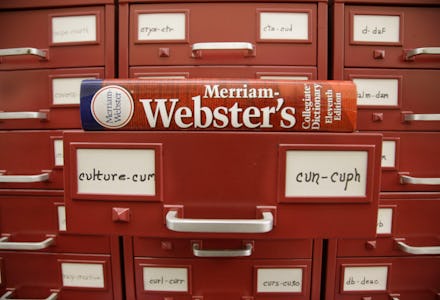Shakespeare was constantly making up new words, and this was well before we had a million different ways to communicate our thoughts and ideas with each other. It only makes sense that now, as words and meanings are as fluid as ever, our language appears to be constantly evolving. This is clear when you consider how many words we use on a daily basis that have no official definition. But, in a valiant attempt at keeping up with us, Merriam Webster regularly updates their dictionary with an eye towards modernity.
“We feel like the service we offer to English speakers is to catalog all the words and meanings in the language,” says Merriam-Webster’s Senior Editor and Lexicographer Emily Brewster in a phone call with Mic. “This is what we have been doing since 1828. We provide a list of these words and definitions to know whether the use of a word is fully established.”
The last time the organization updated its expansive dictionary was in April when they added 640 words or new definitions, including “Snowflake,” “Peak,” and “On-brand.” This month, there are 530 additions that go beyond adding pop culture phrases and internet slang (though that’s in there too; Hello dad jokes!)
Merriam Webster also added a new definition to an existing word: “they.” The expanded definition now includes “used to refer to a single person whose gender identity is nonbinary.” The news was received with a celebration. For folks who identify as nonbinary and gender nonconforming, this was a formal acknowledgment of their pronouns.
“It's an expansion of a use that is sometimes called the “singular they” (and one that has a long history in English),” wrote Merriam-Webster, in its announcement of the addition. “When a reflexive pronoun corresponding to singular use of they is needed, themself is seeing increasing use.”
The updated definition of “they” wasn’t the only notable addition. The word “colorism” was also added, and defined as “prejudice or discrimination especially within a racial or ethnic group favoring people with lighter skin over those with darker skin.” After years of the word shaping discourse about discrimination within communities, it now has a concise definition. And, to make sure they’re able to describe all of the new words they’ve added, Merriam-Webster further defined the word “inclusive” to now include “allowing and accommodating people who have historically been excluded (as because of their race, gender, sexuality, or ability).”
“Bechdel test” — when two women speak in a film and don’t discuss a man — has also been added, as well as “Fatberg,” which is “a large mass of fat and solid waste that collects in a sewer system.” Terrifying! The term is used by New York City officials to address the massive clogging of the city’s piping.
The intention when adding these words and definitions is to pay close attention to what language is doing — whether it’s about meme culture or politics, or how we identify ourselves.
“For most of the life of Merriam Webster, of the dictionary, we have had no idea what words people are looking up, we’ve just been writing our definitions and never knowing,” says Brewster. “Since the dictionary has been online, we have been able to see what words people are actually interested in. That means the relationship between the dictionary and the public has been unidirectional, and now we can be part of the conversation.”
